|
1.
CENTRAL AND WEST AFRICA
Forestry Minister appointed in Gabon
The military coup in Gabon is dominating both the
regional and domestic news. Africanews.com has reported
Gabon's military leader, General Brice Oligui Nguema has
unveiled his transitional government consisting of
representatives from diverse political backgrounds.
The domestic press in Gabon has reported Colonel
Maurice TOSUET has been appointed Minister of Water
and Forests.
Rumours were circulating in trade circles that the previous
Forestry Minister, Lee White, was under house arrest but
in a communication with UK based Declassified UK
Professor White dismissed fears he was missing and
confirmed via WhatsApp saying “I am fine at home in
Libreville where the situation is calm.”
See:
https://declassifieduk.org/british-minister-in-gabon-did-not-see-coup-coming/
Three ministers from Ali Bongo's previous government
have retained their positions. Camélia Ntoutoume-
Leclercq remains the Minister of National Education,
Hermann Immongault, formerly Minister of Foreign
Affairs, now serves as the Minister Delegate for the
Interior and Raphaël Ngazouzé, who previously oversaw
vocational training, has assumed responsibility for the
Civil Service portfolio.
See:
https://www.africanews.com/2023/09/10/gabon-pm-unveils-transitional-government-officials//
and
https://www.lenouveaugabon.com/fr/gestion-publique/0909-20102-transition-voici-les-26-membres-du-gouvernement-de-raymond-ndong-sima
In other news, it has been reported that in Gabon there is a
significant level of unrest within the forestry sector. A
strike has been initiated by all special zone workers at
Nkok. This is said to be because subcontractors have
failed to provide social security coverage for workers.
Also, it is understood that all operators have been
instructed to suspend operations until further notice.
Trucking operations running smoothly
Mid-September usually marks the end of the dry period in
Gabon. Operators report trucking operations were running
smoothly there were no significant disruptions in milling
operations and log stocks are adequate. Producers in
Gabon report demand remains stable in Europe but the
slowdown in demand for some species for the Far East and
the Middle East markets continues.
Weather conditions in Cameroon are markedly different
from Gabon. At present the timber industry is
experiencing disrupted harvesting activities due to heavy
rains. It is reported that milling operations have slowed but
this is not because of a log shortage as stocks are built up
during the dry season.
While export order levels are stable the slower milling
operations have pushed up delivery times. The absence of
Chinese buyers in the market has led to reduced enquiries
from this important market segment.
The timber industry in Congo is currently grappling with
weather-related challenges. Heavy rains have begun in the
southern regions causing delays in timber production. In
the northern regions bordering Cameroon extremely heavy
rains have been reported further disrupting harvesting
activities.
Despite challenges posed by poor road conditions,
transportation on tarmac roads and the Trans Congo rail is
reported as functioning well. The riverside storage area in
Brazzaville continues to be a transship point for logs by
rail to Pointe Noire Port.
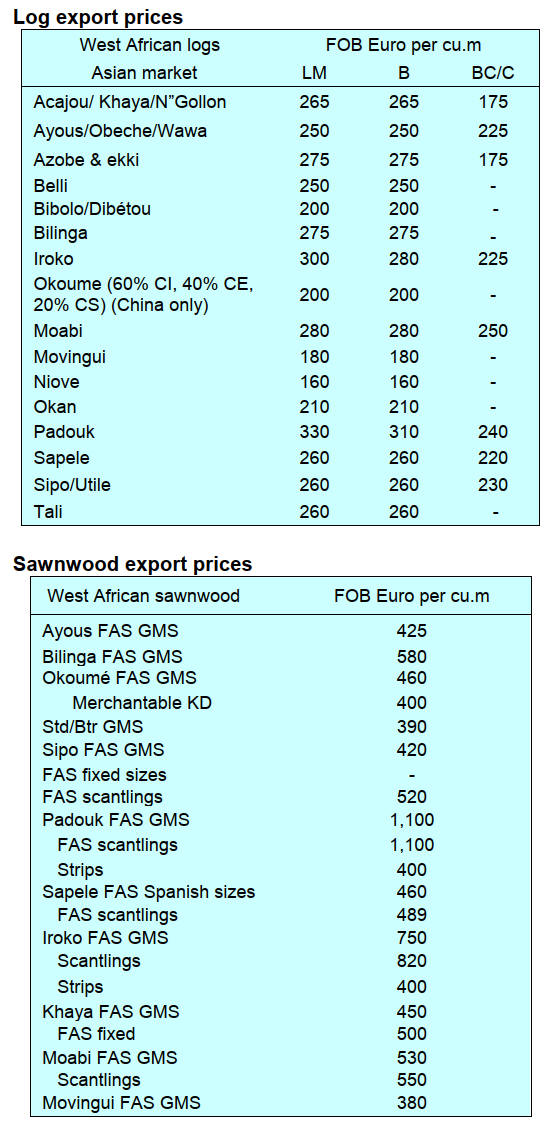
Through the eyes of industry
The latest GTI report lists the challenges identified by the
private sector in the Republic of Congo and Gabon.
See:
https://www.itto-ggsc.org/static/upload/file/20230915/1694740138375092.pdf
2.
GHANA
FLEGT licenses for timber exports to EU
Ghana is set to become the first African country and
second in the world to begin issuing licenses for timber
exports under the Forest Law Enforcement, Governance
and Trade (FLEGT) scheme. This follows the successful
assessment of timber marking and tracking processes in
the Bobiri Forest Reserve in the Ashanti region by a
European Union and Ghana Forestry Commission team.
The FLEGT scheme forms part of measures the Forestry
Commission has instituted in compliance with tree
harvesting regulations, including traceability at origin in
line with the European Union’s Voluntary Partnership
Agreement signed between both countries in November
2019.
In February last year the Minister for Lands and Natural
Resources (MLNR), Samuel A. Jinapor, hosted the
European Union Ambassador to Ghana, HE Ichard
Razaaly. The MLNR Minster discussed key actions
undertaken by government in preparation for the issuance
of FLEGT licenses. He also acknowledged the importance
of Ghana government collaborating with EU to realize the
full benefits of the timber industry.
See:
https://myjoyonline.com/ghana-to-begin-issuance-of-flegt-licenses-for-timber-exports-to-eu
In related news, as part of the Joint Implementation
Committee for the FLEGT VPA the European
Commission is hosting a delegation from Ghana in
Brussels during the week of 18-22 September.
ATIBT, in a news flash, has indicated that the European
private sector is invited to this meeting to exchange views
with the delegation.
The delegation from Ghana has expressed an interest to
meet with private-sector players in the responsible tropical
timber sector to discuss opportunities for developing trade
in Ghanaian timber and the situation on the European
market.
For more see:
https://www.atibt.org/en/news/13372/ghanaian-delegation-to-meet-private-sector-players-in-brussels-on-tuesday-september-19
Billet exports dropped
Ghana’s wood exports to Asian markets accounted for
60% (60,805 cu.m) of the total export volume for the
period January to April 2023 according to data from the
Timber Industry Development Division (TIDD).
This represented a 1,427cu.m volume increase when
compared to that recorded for the same period last year.
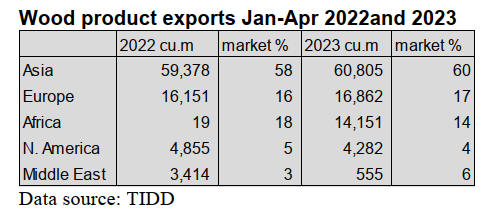
The export of wood products to Asian markets included air
and kiln dry sawnwood, billets, sliced veneer and
mouldings. The major species shipped as billets in the
period January to April 2023 were teak and gmelina which
contributed 5,717 cu.m and 33 cu.m respectively.
The total billet export volume in the first four months of
2023 dropped by 53% from 12,346 cu.m in 2022 to 5,750
cu.m. The corresponding revenue from these exports were
Eur3.78 million in 2022 compared to Eur1.83 million,
registering 52% decline.
According to the TIDD data the country’s primary product
exports in the first four months were teak billets (8,899
cu.m) earning Eur2.86 million and representing 6% of the
total export value Eur45.47 million for the period.
These figures indicated decreases of 28% and 24% in
volume and value respectively as compared to the timber
export contribution of 12,346 cu.m and Eur3.77 million
recorded during the period of January to April 2022.
The top market destinations for Ghana’s wood products
included India (55%), Senegal (7%), Togo (4%), United
States of America (3%) and United Arab Emirates (3%).
India’s imports for the period were mainly kiln-dried
sawnwood and billets which accounted for 8% and 12%
respectively of the total shipments.
India was the primary destination (in terms of value) for
Ghana’s wood products. India’s import volumes of air-
dried sawnwood (46,802cu.m), billets (5,552cu.m) and
sawn teak (3,017cu.m) for the period represented 85%,
97% and 96% of total shipments respectively.
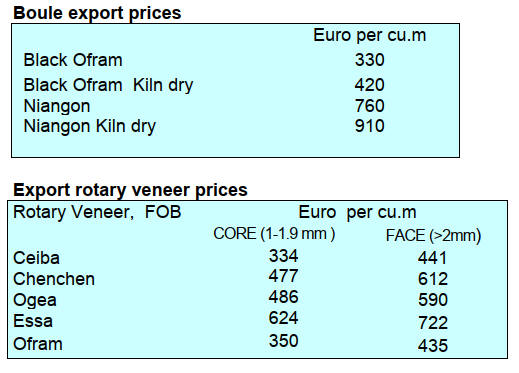
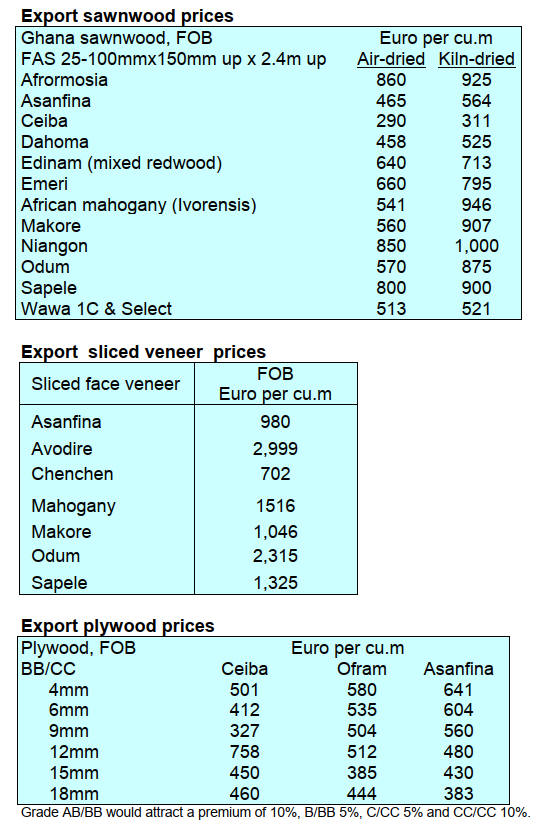
3. MALAYSIA
Industrial Master Plan 2030
The Malaysian government has released some details of
the ‘New Industrial Master Plan 2030’ (NIMP 2030)
which will involve an investment of around RM95 billion
over seven years. The plan aims to generate employment
for around 3 million people through the creation of high-
skilled jobs in the higher value-added sectors which will
adopt automation and high tech manufacturing processes.
The NIMP 2030 has four missions which are to advance
economic complexity, tech-up for a digitally vibrant
nation, to strive for net-zero future and to safeguard
economic security and inclusivity. The NIMP 2030 will
focus on improving the lives of the people through wealth-
sharing for a more equitable society. The median salary in
the manufacturing sector is expected to grow by almost
10% to reach RM4,510/month from the current RM1,976
which is below the national average.
See: https://www.nimp2030.gov.my/
and
https://www.nst.com.my/news/nation/2023/09/949822/govt-rolls-out-seven-year-new-industrial-master-plan-nimp-2030-create-33
Japanese plywood buyers expected to increase
imports
A major Sarawak-based company that produces plywood
expects plywood export prices to improve in the second
half of 2023 as Japan adjusts up the low inventory levels.
The company commented that Japan’s plywood importers
have been restrained by the weak yen in their buying over
the past few months. The yen has depreciated this year
from 128 yen to the dollar in January to about 146 yen to
the dollar currently.
Trading of plywood between Japan and Malaysia is
conducted in US dollars so the weak yen has made
importing more expensive for the Japanese. Japan sources
hardwood plywood mainly from suppliers in Malaysia and
Indonesia as well as smaller quantities from China and
Vietnam.
See:
https://www.thestar.com.my/business/business-news/2023/09/04/ta-ann-expects-plywood-export-prices-to-rise-in-2h23
Sabah 25 Year Forest Master Plan
The Sabah Forestry Department is formulating a 25 year
Forest Master Plan setting the direction for the State’s
long-term forest resources management. The plan, in line
with the Sabah Forest Policy 2018, will focus not only on
forest reserves but also forest areas within state land and
alienated lands.
Around 27% of the State land in Sabah, or about
two million hectares, has been gazetted as Totally
Protected Areas (TPA) and 75% of this is in the area
known as Sabah’s Heart of Borneo project area.
In related news, Sarawak will have soon the largest
protected area including National Parks, Nature Reserves
and Wildlife Sanctuaries through its conservation efforts.
It is reported that the Sarawak government intends to have
over one million hectares in terrestrial protected areas and
over 1.6 million hectares in marine landscapes. With this,
Sarawak will have the largest system of protected areas in
Malaysia under the categories of National Parks, Nature
Reserves and Wildlife Sanctuaries.
See:
https://www.dailyexpress.com.my/news.cfm?NewsID=218723
Furniture Council members mission to Japan
The July/August Malaysian Furniture Council Newsletter
reports a group of 12 entrepreneurs visited Japan in early
July to conduct a marketing mission in Tokyo and
Fukuoka. This offerd an opportunity for the delegation to
witness the latest furniture trends. At the same time the
delegation also visited the Japan Furniture Industry
Development Association (JFIA).
A number of Japanese furniture retailers and wholesalers
such as Tokyo Interior, Otsuka Kagu, Room’s Taishodo,
and Murauchi Furniture Access were also visited by the
delegation.
Through the help of JETRO Fukuoka a B2B session with
Seki Furniture Inc, a major wholesaler in Fukuoka was
conducted. Currently, Japan is the 3rd largest furniture
export destination for Malaysia.
See:https://www.mfc.my/_files/ugd/fd8b5c_9dcdc9b6cbfe4fc0a64d7fa78513de3e.pdf
2024 MIFF announced
MIFF2024 will take place 1-4 March 2024 at the Malaysia
International Trade and Exhibition Centre (MITEC) and
World Trade Centre Kuala Lumpur (WTCKL).
See:
https://www.miff.com.my/visitors/register-now/?cid=edm0609823visregopen
Through the eyes of industry
The latest GTI report lists the challenges identified by the
private sector in Malaysia.
See
https://www.itto-ggsc.org/static/upload/file/20230915/1694740138375092.pdf
4.
INDONESIA
Export benchmark price
of Merbau increased
A press release from the Ministry of Trade provides
Export Benchmark Prices (HPE) for wood products. For
September 2023 were increased for sawn merbau, teak and
sungkai with a cross-sectional area of 1,000-4,000 sq.mm.
For some products the benchmark price was lowered for
example wood chips or particles, sawn wood with a cross-
sectional area of 1,000-4,000 sq.mm of acasia, sengon,
balsa and eucalyptus.
The following is a list of Wood HPE for September
2023:
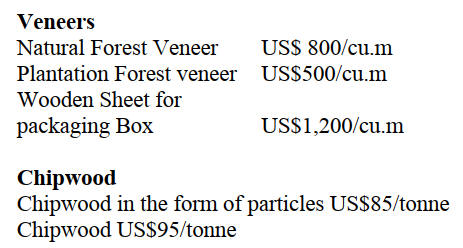
Processed Wood
Processed wood products which are leveled on all four
sides so that the surface becomes even and smooth with
the provisions of a cross-sectional area of 1000 sq.mm to
4000 sq.mm (ex 4407.11.00 to ex 4407.99.90)
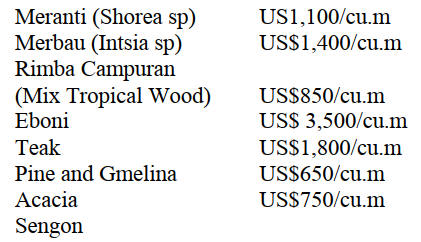 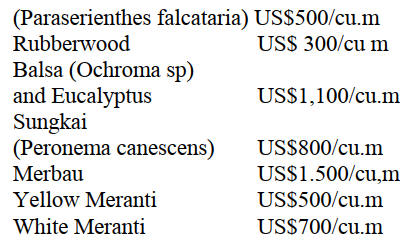
Processed wood that has been dried and leveled on
all four
sides so that the surface is even and smooth with a cross-
sectional area of more than 10,000 sq.mm to 15,000
sq.mm, of the type :

See:
https://forestinsights.id/harga-patokan-ekspor-hpe-kayu-september-2023-kayu-gergajian-merbau-naik/
Encouraging forestry sector down-streaming
Putu Juli Ardika, Director General of Agro Industry in the
Ministry of Industry, said that increasing the added value
to forest products through down-streaming would open up
more jobs, increase export earnongs, generate foreign
exchange, increase state revenues and boost economic
growth.
Currently, the processing industry that is developing
fastest is the wood pellet industry. The wood pellet
industry supports the transformation from fossil-based
energy to New Renewable Energy. This industry has also
been approved for tax benefits.
In 2022 the performance of forest based downstream
industries reach US$15 billion, with imports worth
US$4.68 billion. On the employment side there were 2.83
million workers involved in forest product-based
industries.
Putu explained, in the future, the development of
downstream forest product-based industries will be
directed at commodities whose production takes into
account environmental sustainability principles, including
sources from sustainable raw materials, implementing a
circular economy and playing a role in reducing
greenhouse gas emissions.
See:
https://kemenperin.go.id/artikel/24289/Hilirisasi-Industri-Pengolahan-Berbasis-Hasil-Hutan-Tumbuh-Berkelanjutan
Furniture sector contribution to GDP declined
The Minister of Industry, Agus Gumiwang Kartasasmita,
has reported the furniture sector contribution to National
GDP has dropped. In 2022 the furniture industry
contributed 1.3% to non-oil and gas GDP with an export
performance value of US$2.5 billion. Up to June 2023
exports of furniture and crafts reached US$1.1 billion.
Against this backdrop the Minister explained
several
issues which affect the current and future furniture market
namely the increasing trend to online shopping, the use of
industry-based technology, the increasing demand for
environmentally friendly furniture and the increasing need
for functional, ergonomic designed and customised
furniture especially for the millennial generation.
In responding to these new conditions the Ministry of
Industry has developed a strategy that focuses on three
things, strengthening product promotion media, increasing
production of environmentally friendly furniture and
strengthening reference research on the furniture market.
Apart from continuing to expand the export market it is
also hoped that furniture industry players will also further
develop the domestic market with innovations that are in
line with domestic characteristics and demand.
See:
https://www.tubasmedia.com/industri-furniture-diharapkan-hingga-2029-dapat-memberikan-kontribusi-lebih-besar-terhadap-sektor-manufaktur/
Strengthening forestry business with Finland
A number of Indonesian businesspeople, members of the
Association of Indonesian Forest Concession Holders
(APHI) and representatives of the Indonesian Chamber of
Commerce and Industry (Kadin) visited Finland. A
memorandum of understanding was signed between the
Medco Group and the Finnish technology company,
Valmet Technologies Oy for the development of biomass
energy development.
Medco Group's Papua Project President Director, Budi
Basuki, explained the mission of the Papua Project with
the support of Valmet is "Brightening the Eastern Part of
Indonesia with a Biomass Power Plant".
After successfully building and operating a 3.5 MW
Biomass Power Plant (PLTBm), Medco Group will
develop another plant with a total capacity of 55 MW. The
biomass used is sourced from wood chips.
See:
https://forestinsights.id/pengusaha-indonesia-kunjungi-finlandia-untuk-perkuat-bisnis-kehutanan-mou-pemanfaatan-biomassa-ditandatangani/
and
https://www.suara.com/pressrelease/2023/09/06/150500/indonesia-finlandia-tandatangani-kesepakatan-kerja-sama-biomassa-hutan-dalam-forum-ireis-2023
Technology can increase competitiveness of
timber
sector
Indonesian wood and furniture products, which are known
for their uniqueness and beauty, can improve their
competitiveness through the adoption of advanced
technology.
This was the theme of a seminar "Unlocking
Opportunities: Integrating IFMAC & WOODMAC
Technology in Indonesia's Growing Furniture Industry"
held in Semarang in late August.
The seminar was part of the preparations for the IFMAC
& WOODMAC 2023 exhibition.
Wiradadi Soeprayogo, Chairman of the Presidium of the
Indonesian Sawmill and Wood working Association
(ISWA), said that the growth potential for the Indonesian
wood processing and furniture industry in the global
market is enormous but will need the adoption of
technology if the opportunities are to be captured.
He explained that with the introduction of advanced
technology and innovative solutions from global
companies Indonesia can increase the competitiveness of
local furniture businesses while creating new opportunities
for investment, employment and economic growth.
See:
https://surabaya.tribunnews.com/2023/08/25/bangkitkan-pasar-industri-kayu-indonesia-himki-iswa-dan-wakeni-gelar-pameran-ifmac-woodmac-2023
ASMINDO participates in South Korean exhibition
The Indonesian Embassy in Seoul, the Ministry of Trade,
and ASMINDO (Indonesian Furniture and Handicraft
Industry Association) participated in the KOFURN 2023
exhibition in South Korea. At the event, ASMINDO
Chairman Dedy Rochimat signed a memorandum of
understanding with KFFIC (Korea Federation of Furniture
Industry Cooperatives) Chairman Lee Sung Jong
regarding the development of the furniture industry in
Indonesia and the Republic of Korea.
KOFURN 2023 is Korea's largest global furniture and
interior exhibition with more than 4,000 entries and a sales
value of US$1.6 million. This year, 13 manufacturers from
Indonesia promoted natural materials, handcrafted and
unique artisanal products packaged through a variety of
products to decorate the home or hospitality projects.
See:
https://www.msn.com/id-id/ekonomi/other/kenalkan-furnitur-indonesia-asmindo-ikuti-pameran-di-korea-selatan/ar-AA1fPAPy
EU Counselor - SVLK cannot satisfy due diligence
required by the EUDR
At a recent event the First Counsellor for Environment,
Climate Action and Digital cooperation at the European
Union Delegation to Indonesia and Brunei Darussalam,
Henriette Faergemann was reported by Kompas, an
Indonesian national newspaper,as saying “We (the EC) are
of the view that all of the sustainability certificates
including the ISPO, RSPO, MSPO and SVLK can support
forest and environmental sustainability but cannot replace
the due diligence required by the EUDR”.
“We believe that all sustainable certificates, including
ISPO, RSPO, MSPO, and SVLK, can support forest and
environmental sustainability, but they cannot replace the
thorough testing required by EUDR” said Faergemann.
Faergemann is also reported as saying the EU Commission
and Parliament does not have the mandate to verify
sustainable certificates.
In addition, the EU does not have sufficient resources to
check all sustainable certificates from hundreds of
countries.
The EUDR mandates that seven commodities entering the
EU market must not originate from land deforested or
degraded forest land after December 31, 2020. The seven
commodities are coffee, palm oil, cattle, soybeans, cocoa,
wood, charcoal, and rubber, as well as derived or
processed products such as meat, furniture, paper, leather,
and chocolate.
The regulation requires products to be certified through
due diligence based on geolocation or based on satellite
imagery and global positioning system (GPS) coordinates.
Large companies have 18 months and small companies 24
months to comply with various requirements in the
regulations that took effect on June 29, 2023.
See:
https://www.kompas.id/baca/english/2023/08/24/en-uni-eropa-syarat-uji-tuntas-eudr-tak-tergantikan
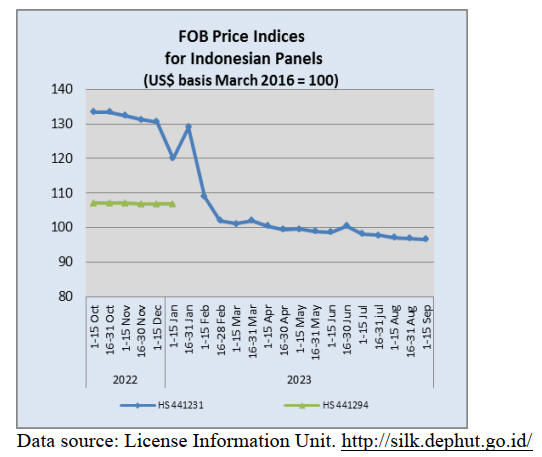
Through the eyes of industry
The latest GTI report lists the challenges identified by the
private sector in Indonesia.
See:
https://www.itto-ggsc.org/static/upload/file/20230915/1694740138375092.pdf
5.
MYANMAR
Conserve forests and green urban areas – Prime
Minister
Myanmar Prime Minister, Senior General Min Aung
Hlaing, stressed the importance of conserving forests close
to rural communities and also encouraged urban dwellers
to green their environs as a national duty. This was
announced at the fourth monsoon tree-growing ceremony
2023 in Nay Pyi Taw. The PM also said the extraction of a
sustainable volume of timber is necessary for the
development of the nation and that replanting trees will
improve the socio-economic lives of the people.
Analysts interpreted his statement as a suggesting the
probability of a resumption of log harvesting which was
halted when the military-led government took the power
on 1 February 2021.
It is understood that the Myanma Timber Enterprise
(MTE) intended to harvest about 6,000 tons of teak in
2023-24 but there is no statement of the MTE Annual
Harvest Plan. According to the website of the MTE the
last announced Annual Harvesting Plan was for 2020-21.
The Prime Minister pointed out the current average
temperature of the capital is 28.50°C although it was
26.97°C in 2006. While reporting the current forest cover
at 42% he cited the unlimited extraction of timber by the
colonialists and the continued extraction to bolster finance
of the State in successive eras as a cause of forest loss.
Myanmar has been blamed for excessive harvesting but
the rate of harvesting was drastically reduced in 2014
when the log export ban was enacted. The trend of
reduction of harvesting was enhanced by enacting a
logging ban during the previous NLD (National League
for Democracy). The logging ban was for ten years in
Bago Yoma and for one year over the entire country in
2016-17.
See:
https://www.gnlm.com.mm/everybody-needs-to-conserve-forests-in-rural-areas-and-green-urban-areas-as-national-duty/
Investment in manufacturing sector
Myanmar’s manufacturing sector attracted more than
US$63.5 million from 26 enterprises in the five months to
August of the current financial year 2023-2024 including
capital expansion by the existing enterprises. This was
reported by the Directorate of Investment and Company
Administration (DICA). Chinese companies primarily
made investments in the manufacturing sector.
The Myanmar Investment Commission approved a total of
31 foreign projects from seven countries in the past five
months with an FDI of US$484 million
including expansion of capital by the existing enterprises
and the power sector topped the FDI line-ups with
US$317.178 million from two enterprises.
The manufacturing enterprises that need a large labour
force are prioritised to create job opportunities for the
local community. Myanmar’s manufacturing sector is
largely concentrated in garments and textiles produced on
a cutting, making and packing (CMP) basis and it
contributes to the country’s GDP to a certain extent.
See:
https://www.gnlm.com.mm/myanmars-manufacturing-sector-attracts-fdi-surpassing-us63-5-mln-in-april-august/
Expatriate workers must remit minimum 25% of foreign
currency income back to Myanmar
The Myanmar Government is now demanding that
expatriate workers remit at least 25 percent of their foreign
currency income back home through the country’s banking
system.
CB Bank, one of the country’s largest private banks,
recently told migrant workers they must remit a quarter of
their salaries either monthly or every three months through
official channels.
Migrant workers who do not comply will be barred from
working overseas for three years after their current work
permit expires, the announcement warns.
See:
https://www.irrawaddy.com/news/burma/cash-starved-junta-milks-myanmar-migrant-workers-with-new-remittance-rule.html
6.
INDIA
Farm forest expansion held
back by regulations
Plyinsight has reported that Sajjan Bhajanka, President of
Federation of Indian Plywood and Panel Industry, has said
because wood grown on farmland is considered as a forest
product it is subject to all the regulations that apply to
forest products and this discourages farmers from growing
trees.
The Federation proposes shifting farm-forest from the
forest sector to the agriculture sector which would provide
more economic benefits to the farmers so they would be
encouraged to plant more trees.
The Federation also proposed the removal of licensing
requirement for wood-based units that primarily use ‘farm
forest wood’ as raw material. This, it is claimed, will
support the establishment of sustainable businesses at the
plantation sites and generate employment and livelihood
opportunities for farmers.
See: https://plyinsight.com/economic-benefits-of-agriculture-sector-should-be-extended-to-agroforestry/
US$5.8 trillion real estate sector possible by 2047
A recent report by Knight Frank India prepared in
collaboration with the National Real Estate Development
Council (NAREDCO), forecast India's real estate sector
could expand to a staggering US$5.8 trillion sector by
2047. This would represent a significant increase from the
current estimated value of US$477 billion. If this is
achieved the real estate sector will contribute 15.5% to
total economic output in 2047 from an existing share of
7.3%.
However, some analysts point to a housing crisis for the
poor in the capital saying the slow speed of building
affordable housing, reduced land and space entitlements,
accelerated housing production for the privileged and
large-scale demolitions and evictions have contributed to
what some consider an urban housing crisis.
See:
https://www.thehindu.com/business/realty-sector-set-to-expand-to-58-tn-in-2047-knight-frank/article67235781.ece
and
https://www.aljazeera.com/gallery/2023/8/30/photos-the-housing-crisis-for-the-poor-in-indias-capital
G20 to support new trade corridor
India hosted this year's Group of 20 summit and on the
sidelines world leaders unveiled a project to create a rail
and shipping corridor linking India, the Middle East and
Europe. This project is considered historic as it would
improve trade logistics.
See:
https://www3.nhk.or.jp/nhkworld/en/news/20230910_13/
Weak currency a problem for importers
The rupee exchange rate against the US dollar is very
close to its historic low in six months despite the Reserve
Bank of India (RBI) action in the currency market to lower
volatility. Having traded in its narrowest range in two
decades this year the rupee fell to a 10 month low of 83.18
in early September close to the 83.29/US$ record low in
October 2022. A weakening currency is always a problem
for importers but currency volatility creates a risky trading
environment.
Inflation in India is expected to remain above the RBI's
2% to 6% target range until October. Rather than policy
action the RBI has focused efforts on market intervention
spending around US$14 billion in August.
See:
https://www.reuters.com/markets/currencies/indian-rupee-stay-weak-third-analysts-expect-new-low-within-year-2023-09-07/
Domestic investment lifts GDP
The International Monetary Fund forecast a decline in
India's GDP growth over the next two years saying GDP
growth could fall from 7.2% in FY23 to 6.1% in the
current financial year and then rise slightly to 6.3% in
FY25.
The latest World Economic Outlook data projected a 0.2%
point upward revision from its April estimates reflecting
momentum from stronger-than-expected growth in the
fourth quarter of 2022 as a result of stronger domestic
investment.
See:
https://www.livemint.com/news/india/indias-gdp-growth-to-drop-in-coming-months-imf-projects-6-1-growth-in-fy24-11690290502927.html
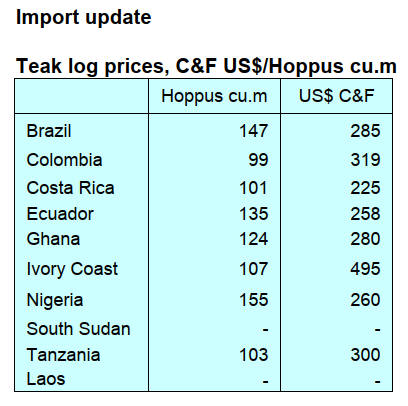  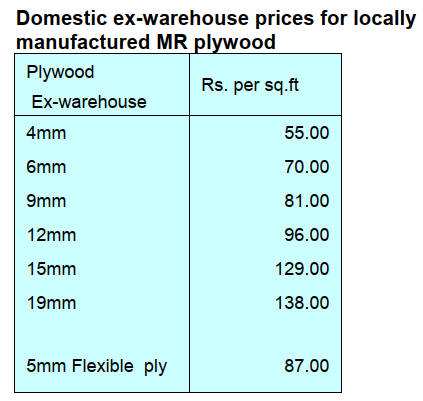
7.
VIETNAM
Vietnam - Highlights of wood and wood product
(W&WP) trade
According to the General Department of Customs,
Vietnam's W&WP exports to South Korea in August 2023
amounted to US$66 million, down 10% compared to
August 2022. In the first 8 months of 2023 W&WP
exports to S. Korea were estimated at US$528 million,
down 22% year on year.
In August 2023 bedroom furniture exports were valued
at
US$136 million, down 29% compared to August 2022. In
the first 8 months of 2023 exports of bedroom furniture
earned US$998 million, down 39% over the same period
in 2022.
Vietnam's imports of padouk wood in August 2023
amounted to 12,000 cu.m, worth US$4.2 million, up 3% in
volume and 2% in value compared to July 2023.
Compared to August 2022 imports decreased by 48% in
volume and 56% in value. In the first 8 months of 2023
imports of padouk were 90,400 cu.m, worth US$33.6
million, down 18% in volume and 29% in value over the
same period in 2022.
Vietnam firms anticipate robust export
opportunities in
the US
The US President visited Vietnam in September at the
invitation of Party Secretary General Nguyen Phu Trong
as the two countries celebrated the 10th anniversary of
their comprehensive partnership.
More export opportunities
According to the General Department of Customs in the
first seven months of this year shipments of wood and
wood products to the US reached US$3.9 billion,
accounting for 54% of the entire industry's exports. The
US has been the largest market for wood products from
Vietnam for years.
Nguyen Chanh Phuong, Vice Chairman of the Handicraft
and Wood Industry Association of HCMC (HAWA), said
when the bilateral relationship is in good shape businesses
will benefit.
Phuong noted that Vietnam believes in the stability and
development of the US market. He anticipates inflation in
the US will fall and purchasing power will increase again.
Tran Lam Son, Deputy General Director of Thien Minh
Import-Export Co., Ltd., expected many large US furniture
enterprises to come to Vietnam and visit furniture
manufacturing hubs after Biden's visit. Thien Minh
specialises in outdoor furniture products made from
plantation wood.
See:
https://theinvestor.vn/vietnam-firms-anticipate-robust-export-opportunities-from-president-bidens-visit-d6511.html
Amazon, Alibaba demand more Vietnam-made home
décor
As purchases of home decorations and compact furniture
on e-commerce platforms such as Amazon and Alibaba
increase opportunities are opening up for Vietnamese
businesses to sell made-in Vietnam products.
According to Amazon statistics home decoration and
furniture items have experienced outstanding growth in the
2020-2022 period. Even after returning to the office,
people still spend a lot of time enjoying their life at home
and online shopping for such products continues.
Over the past three years home and kitchen decor
have
been some of the best-selling item categories for
Vietnamese sellers on Amazon. In the last three months,
potential buyers for Vietnamese products in this category
have increased 64% year-on-year.
The most sought-after items have been dining sets,
kitchenware, home textiles and affordable, practical
storage, according to Alibaba.
See:
https://e.vnexpress.net/news/business/industries/amazon-alibaba-demand-more-vietnam-made-home-decor-4648742.html
Vietnam’s imports of padouk wood from Africa
decreased slightly
Vietnam's padouk imports from Africa, the largest
supplier, accounted for 83% of total padouk imports in the
first 7 months of 2023, down 4% in volume and 7% in
value over the same period in 2022, to 65,500 cu.m, worth
US$19.5 million.
According to statistics from Vietnam General Department
of Customs, Vietnam's padouk imports in July 2023 were
1,600 cu.m, worth US$4.1 million, down 5% in volume
and 4% in value compared to June 2023. Compared to July
2022, imports dropped 29% in volume and 31% in value.
The average import price of padouk in the first 7 months
of 2023 was around US$373.5 per cu.m, down 14% over
the same period in 2022. In particular, the price of padouk
wood from Africa decreased by 4% to US$297.0 per cu.m.
Padouk wood suppliers
In the first 7 months of 2023 volume of padouk from
Africa, Laos and China decreased compared to the same
period in 2022 while, imports from Thailand, Hong Kong,
Tanzania, Denmark and the UAE increased.
Padouk from all African suppliers accounted for 83% of
total imports in the first seven months of this year reaching
65,500 cu.m, worth US$19.5 million, down 4% in volume
and 7% in value over the same period in 2022.
Imports from Laos decreased by 42% in volume and 46%
in value over the same period in 2022, amounting to 7,200
cu.m, worth US$7.8 million and accounting for 9% of
total imports in the first 7 months of this year.
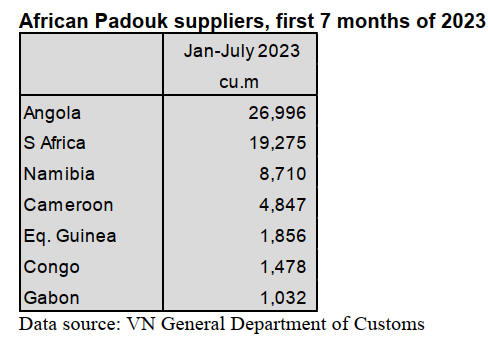 . .
8. BRAZIL
Wood frame construction
takes off
Wood frame construction is gaining acceptance in Brazil.
Plantation pine is the main input for wood frame building
structures. This system has been seen to offer benefits
such as faster construction, waste reduction and energy
savings.
The recent standardisation of timber frame construction
published by the Brazilian Association of Technical
Standards (ABNT) is generating interest in the sector as an
important step for industrialised and sustainable
construction across the country. The advantages in wood
frame construction are said to be thermal and acoustic
comfort, shorter construction times and competitive prices.
Wood frame construction can help to tackle the housing
shortage in Brazil.
The southern region of Brazil, especially the states of
Paraná and Santa Catarina, where a large part of the
country's pine plantations are available can benefit from
this construction method. Pine sawnwood and panels are
readily available in the country. Wood frame construction
represents a viable and technologically advanced
alternative to civil construction in Brazil without
necessarily replacing traditional methods but
complementing and contributing to technological
diversification in the sector.
According to ABIMCI (Brazilian Association of the
Mechanically Processed Timber Industry) the publication
of the technical standard for wood frame construction was
an important achievement for the timber industry and the
civil construction sector.
See:
http://www.remade.com.br/noticias/19405/construcao-mais-rapida--preco-competitivo-e-tecnologia:-a-aposta-de-crescimento-do-setor-de-madeira
Acre and Mato Grosso discuss joint action in the
timber sector
Representatives and entrepreneurs of the timber sector in
the states of Acre and Mato Grosso recently discussed
strengthening the sector in the Amazon Region. The
stakeholders who took part in the discussion included
entrepreneurs from timber-producing municipalities,
managers of the Center of Timber Producing and
Exporting Industries of the Mato Grosso State (CIPEM)
and Task Force of Governors for the Forest and Climate
(GCF Task Force), the Acre Timber Industries Union
(SINDUSMAD/AC), the Secretariat for the Environment
and Indigenous Policies (SEMAPI), the Acre Environment
Institute (IMAC) and the Acre Planning Secretariat
(SEPLAN).
The main objective of the meeting was to explore options
for boosting the forest sector in the region with a focus on
the bio-economy as an essential pillar for balancing
economic and social development and environmental
conservation. The hope is to present a sustainable
development model appropriate for the region at COP30
(30th Conference of the Parties to the United Nations
Framework Convention on Climate Change) in 2025.
During the discussions the similarities and differences
between the two states were analysed especially in relation
to licensing systems and challenges in finding a public
policy on forest management that works for both states.
The Acre State government has the strengthening of the
timber sector as a priority and the dialogue with Mato
Grosso enabled an exchange of experience and
development of options for the sector.
See:
https://forestnews.com.br/acre-mato-grosso-acoes-setor-madeireiro/
Performance of the furniture sector in the first
half of
the year
Exports of furniture and mattresses declined significantly
in June 2023 totalling US$59.0 million, a 12% drop
compared to the previous month. This negative
performance impacted the first half year performance
which dropped 16% compared to the same period in 2022
with exports totalling US$349.2 million compared to
almost US$417.0 million in the first half of last year.
There has been a continuous downward trend in export
earnings over the last 12 months with an 18% decline in
the value of exports. Several factors, including currency
fluctuations, logistical challenges and international
competition contributed to this negative trend.
The United States remains the main export market for
Brazilian furniture accounting for around 32% of the total
exported by the sector in the first half of 2023. Other
destinations that have shown significant trade include
Uruguay, Chile, the United Kingdom, France and the
Netherlands.
The Brazilian Furniture Industry Association
(ABIMÓVEL) and the Brazilian Trade and Investment
Promotion Agency (ApexBrasil), in partnership with
public agencies and companies in the sector, are
developing strategies to reverse this negative trend and
increase exports of Brazilian furniture.
The sector is looking for innovation, quality and global
competitiveness in order to face the current challenges and
guarantee its relevant role in the Brazilian economy.
Cooperation between the industry, the government and
other stakeholders is considered crucial to stimulate
exports to ensure the sector's future growth.
See:
https://forestnews.com.br/exportacoes-moveis-e-colchoes-flutuacoes/
Woodflow export system for wood products
A fully online software service ‘WoodFlow Exporter
System’ has been introduced to facilitate timber exports.
The system allows companies to manage their foreign
trade operations in an analytical and secure way.
Companies that export wood products are able to use the
programme without having to register on the WoodFlow
platform making it an accessible and secure tool for
sharing information with foreign buyers.
Each company is responsible for inputting data and the
platform, among other features, will allow exporters to
have a strategic overview of all their shipments,
profitability and even the documentation for each process.
The entire system is highly secure, following the General
Data Protection Act (Lei Geral de Proteçăo de Dados -
LGPD).
This system also assures improved reliability of export
document storage, simplified online monitoring of the
process and provides customised dashboards to check
results and costs.
See:
https://www.madeiratotal.com.br/woodflow-aposta-em-sistema-saas-para-exportacao-de-madeira/
Through the eyes of industry
The latest GTI report lists the challenges identified by the
private sector in Brazil.
See:
https://www.itto-ggsc.org/static/upload/file/20230915/1694740138375092.pdf
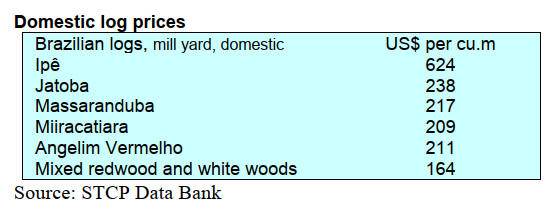
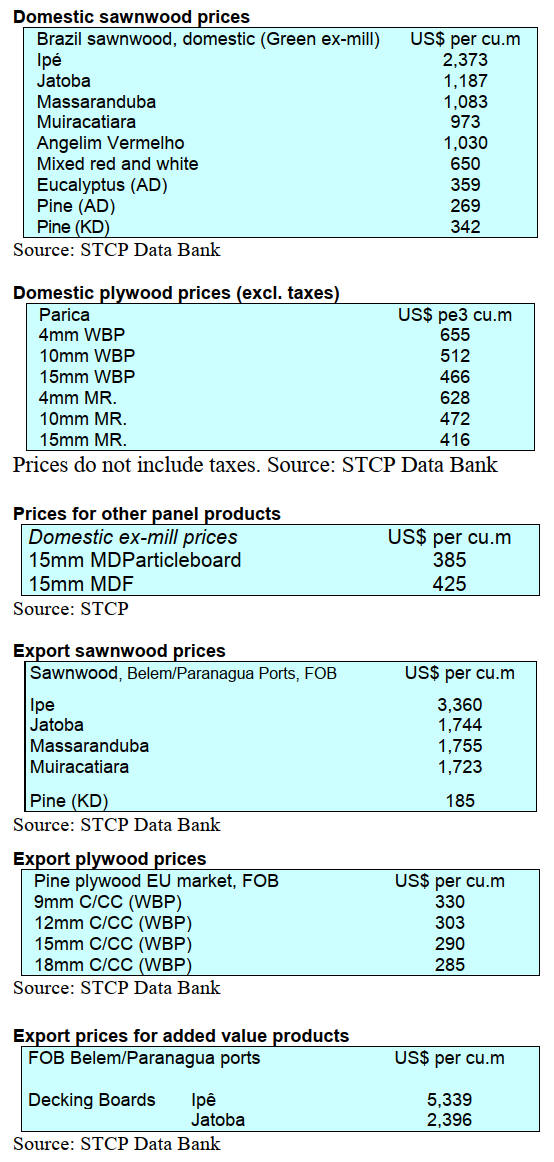
9. PERU
Wood product exports
fell in the first half of the year
Shipments of wood products between January and June
totalled US$54.3 million which was a decline of 28%
compared to the same period in 2022 (US$75.8 million)
according the Association of Exporters (ADEX).
This contraction is partly explained by lower orders from
Peru’s two main buyers, France (US$10.8 million) and
China (US$10.7 million) which decreased their demand by
22% and 30% respectively.
In the case of France the increase in the price of Peruvian
wood products made Peru less competitive compared to
suppliers from other countries such as Brazil and Russia.
Regarding China, the real estate sector is going through a
deepening crisis with a growing risk of default among
some developers seeking to sell apartments and demand
for wood products in this sector has dropped sharply.
Other export destinations were Mexico (US$8.2 million),
a year on year increase of 50%, the Dominican Republic
(US$5.7 million) a reduction of 40% and the US (US$3.9
million) with a contraction of 33%. Completing the top ten
export markets were Belgium (US$2.9 million), Ecuador
(US$2.4 million), Vietnam (US$1.9 million), Denmark
(US$1.5 million) and Chile (US$0.9 million).
According to figures from the ADEX Data Trade
Commercial Intelligence System, semi-manufactured
products were the most traded, accounting for US$22.4
million of the total but with a decrease of 42%. Second in
the ranking was sawnwood, at US$21.9 million despite
falling 17%.
Others were construction products (US$2.6 million);
fuelwood and charcoal (US$2.2 million); furniture and
parts thereof (US$1.8 million); manufactured products
(US$1.5 million); plywood (US$1.2 million), veneers and
sheets (US$0.65 million). In the first six months of the
year the most important exporting companies were
Maderera Bozovich, IMK Maderas, Grupo Maderero
Amaz, Consorcio Maderero and Industria Forestal
Huayruro.
Regional authorities promote agroforestry systems to
increase forest cover
With the aim of promoting agroforestry systems to reduce
deforestation in the Amazon forests, the National Forestry
and Wildlife Service (SERFOR) and the Regional
Government of Ucayal recently conducted an event
“Exchange of experiences in the implementation of
Agroforestry Systems (SAF)”.
This event, which took place in the city of Pucallpa,
brought together governors of Ucayali, Loreto and
Huánuco, regional authorities of San Martín, Madre de
Dios, Midagri, SERFOR, producers, international
cooperation agencies and businesspeople.
The SAF combine agricultural and forestry activities and
their function is to maintain and restore forest ecosystems,
to make them sustainable and increase productivity both
on state lands and on private properties. The Regional
Governor of Huánuco and president of the Amazon
Regional Commonwealth, Antonio Pulgar Lucas,
inaugurated the event and reported that in his region more
than 400 hectares have been delivered to the associations
under the Transfer in Use Contracts for Agroforestry
Systems (Ccusaf).
For his part, the Executive Director of SERFOR, Alberto
Gonzales-Zúńiga, presented the ‘Strategic Framework for
Reducing Deforestation through Agroforestry Systems’ in
which regional and local governments, producer
organisations and the private sector have a role.
Alliance promotes digital tools in forest management
The Forest and Wildlife Resources Supervision Agency
(OSINFOR) and the Regional Forestry and Wildlife
Management (GERFFS) of Ucayali have joined to
promote the use of technological tools for forest
management among the holders of new enabling titles in
the region.
The main objective of this initiative is to improve the
monitoring and compliance with forestry and wildlife
obligations by the holders of enabling titles in order to
guarantee sustainable use of these resources.
The collaboration between OSINFOR and GERFFS
reinforces the commitment of both institutions in
promoting responsible practices in forest management and
contributing to the conservation of forests and biodiversity
in the region.
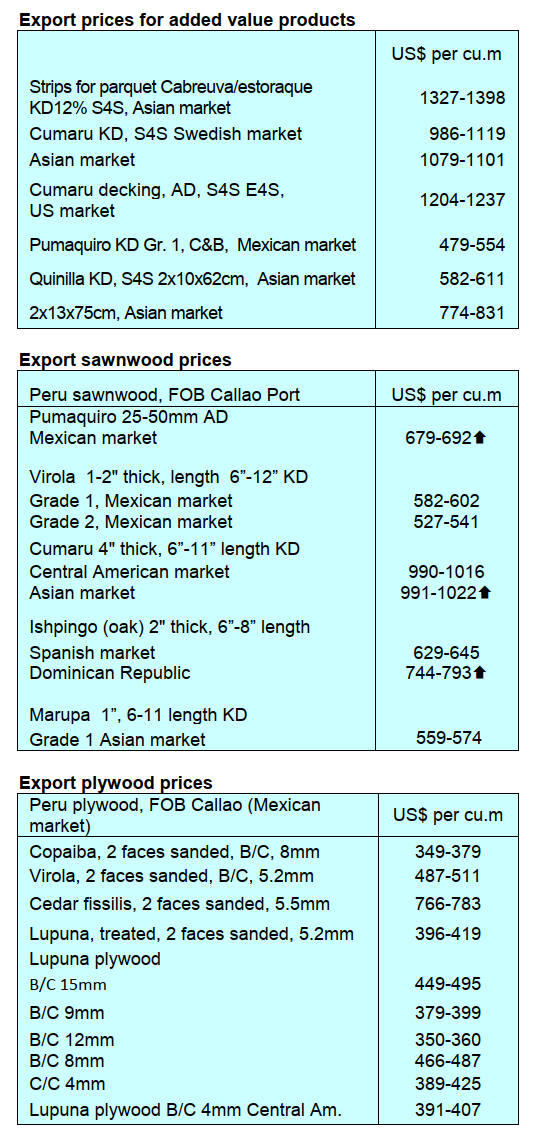 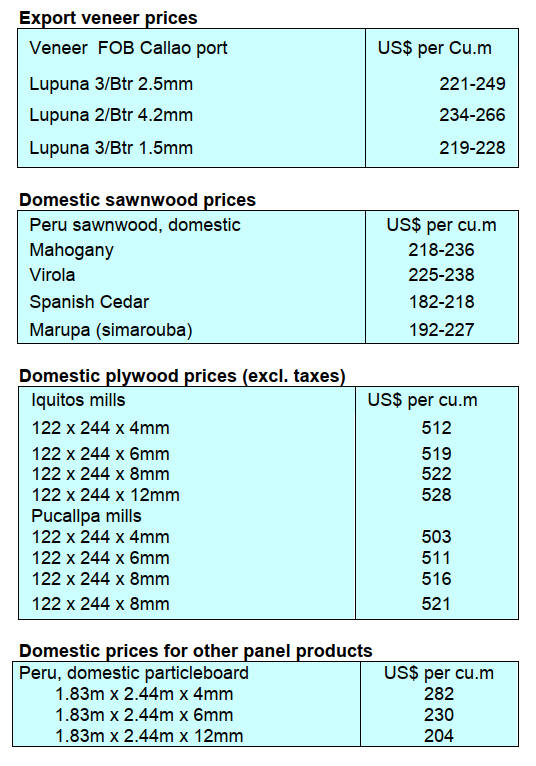
|